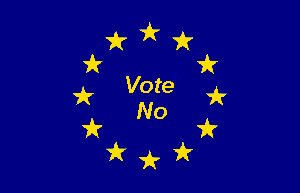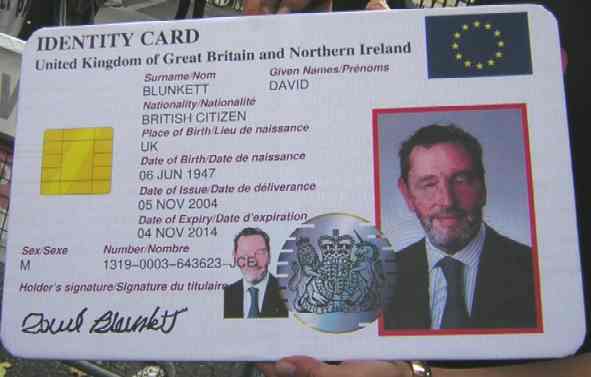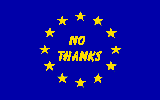

What's New in 2005...
1975 REMEMBERED
Many people are casting their thoughts back to the 1970s, after the former PM and Labour peer,
Lord Callaghan, died in Easter week.
Many will remember him for his short premiership (1976/9) but when Foreign Secretary, he was also the
agent of Britain's renegotiation of its EEC membership in 1974/5. The hype surrounding
this allowed the public to rubber stamp membership in the 1975 referendum;
a decision we have come to regret.
The Wilson government's 'renegotiation' was a fraud - it tweaked secondary matters like budget contributions
and trade terms for New Zealand. Predictably it failed on Common Agricultural Policy 'reform' and the 'power'
issue (e.g. unilateral state aid) as it was not legally possible to 'repatriate' powers from within the EEC
(The same holds for its successor, the EU).
Although the 1974 Labour Party conference had refused to accept membership at
the expense of sovereignty, PM Harold Wilson stitched a deal with the German Chancellor
at the Paris European Council meeting in which he offered to guarantee Britain's EEC membership. In return, Chancellor Schmidt
would deliver sufficient 'concessions' to allow Wilson to claim that 'renegotiation'
had been a 'success'.
(See 'The Great Deception', Booker and North, 2003)
EU (and EEC) legal order explained
'Renegotiation' explored for 2006
 BLUNKETT'S MISTAKEN IDENTITY
BLUNKETT'S MISTAKEN IDENTITY
The House of Commons has voted for the Identity Cards Bill. It is now up to the House of Lords to show some sense in throwing out the proposal.
There are rumblings that the Government might drop the Bill given the legislative congestion before the predicted
General Election. But remember - the same line was floated in the media on the draconian
Civil Contingencies Bill
in November, and it was allowed to sneak through. Be vigilant.
An amusing twist from the Hansard debate, (Commons, 10.2.05, col.1753) came when John Bercow MP claimed that Mr Blunkett:
"...took the biscuit when he asserted 18 months ago that the merit of the introduction of ID cards -
eventually to become compulsory - was that they would enable us to assert our "sense of belonging".
Many people in this country feel a sense of alienation, from the Government
or their local community, or both. I have yet to meet a single constituent in Buckingham
who has said to me, "John, I feel a terrible inability to assert sense of belonging
because I do not possess an identity card".
But many a true word spoken in jest?
EU health commissioner Anna Diamantopoulou remarked in Feb 2003:
"After the euro.... the European health card is another piece of Europe in your pocket".
Its purpose - of promoting a European identity - was pushed as far back as 1985. (See: Adonnino Report (A People's Europe - 6/1985 Bulletin of the EC, Suppl.7/85, eureferendum blogspot, 17.8.04 )
Other official expressions of 'EU identity' are already in place - the current UK driving licence has the 'EU flag' and the front of a passport the words 'European Union'/'European Community'.
The Home Office confirmed (ID Cards Programme Team correspondence, 4.8.04) that "The European standard to which the driving licence / identity card would need to conform does not allow for national symbols, only the European 'Circle of Stars' ".
MORE EU CONNECTIONS...
"EU-member states are preparing the piecemeal introduction of identity
cards in the form of "smart cards"...
enabling authorities to keep track of citizens in a borderless Europe."
"Britain plans to link all NHS computers as a first stage to the introduction
of a national card system that could later serve as an ID card...
Due to public resistance, Germany and the Netherlands have introduced
universal computerised health cards instead."
- 'Fortress Europe? Circular Letter', no 23, March 1994 (Sweden)
quoting as source: Independent article, Leonard Doyle (3.2.94)
www.fecl.org
"Asked whether a single EU ID card would become essential in order
to track people across the EU, the Prime Minister's Official Spokesman
said that fingerprinting and identification was obviously an important part of
any tracking system"
- Press Briefing (20.5.02)
www.number-10.gov.uk/output/Page2409.asp
"Mr. Blunkett says arrangements have been made with other EU
countries to establish recognition of their ID cards"
- 'ID card system a sham',
IT industry commentator, Guy Kewney (11.11.03)
www.newswireless.net
"EU partners planning a smart card for all things"
- Guardian article, Amelia Gentleman (15.11.03)
www.guardian.co.uk
"an important step in the process of European integration...
the final goal of the Italian government for the electronic ID card is...
to strengthen the feeling of unity within the EU"
- 'Pan-European Electronic Identity Being Developed in Wide Cooperation',
(report published 22.12.04) on '6th International Porvoo Group' conference, Rome, 9-10.11.04,
quoting Italian senator, Antonio D'Ali.
www.e.finland.fi
"It is good that the Home Office wants to consult different ethnic
and religious groups in the UK... The meeting started with a presentation on the proposed ID Cards. We were told that these ID Cards
are the result of a European Union decision, and that all member countries are going to adopt them".
- report on 'faith groups consultation' on ID cards, Fujitsu building, Finsbury Square, London; March 2005,
Surbut Khalsa (also published in issue 152 of the Sikh Times).
http://www.surbut-khalsa.com/11.columns/The%20man%20in%20blue/157-05.htm
NEW LAB USES FEAR TO PUSH ID CARDS
According to the Independent (24.11.04), discredited media reports were used to
create a climate of fear, just before the Queen's Speech, in which plans for compulsory
ID cards were announced. Despite being available for several days, rumours of a '9/11'
type attack on Canary Wharf were held back.
The rumours were attributed to lobby correspondents rather than established journalists
specialising in crime or terrorism, and the finger pointed at the Home Office, who have a
track record in hyping ID cards.
Maybe David Blunkett and the Home Office aren't so sure of their claim of '80% public support
for ID cards' after all? A MORI survey revealed that only 19% would be prepared to pay over
£25 for an ID card - less than the touted cost!
On ITV's Jonathan Dimbleby programme (20.11.04), Blunkett also let it
slip that it would not be necessary to use biometric ID cards to verify the identity
of suspects stopped by the Police.
On another tack, the BBC noted:
Blunkett's speech to the NewLab-leaning Institute for Public Policy Research.
He ridiculed a newspaper story which had suggested that compulsory ID cards
could allow the government to track how everybody shopped.
Well let's look at the
Home Office website Q&A:
"Many people will choose to use a card as a convenient way to verify
their identity when accessing public or private sector services.
However, a requirement to make use of the card a condition of the
provision of services could only be made once the scheme becomes
compulsory".
- How could the verification facility work unless the commercial organisation's terminal was connected up
to the central Population Register? The latter would have an audit trail facility that recorded every time the card was used... effectively enabling tracking?
For our feature on planned EU ID cards and the Population Register
 BUDGET 2005 - SOME EU ANGLES
BUDGET 2005 - SOME EU ANGLES
How does Chancellor Brown's pre-election budget stack up?.
The Budget Report admits: "About half of all significant new regulations affecting UK
businesses originate in EU law" (3.40, p.60)
Technically it's 'EC law', unless they've adopted EU Constitution-like rules without telling anyone. The government promises that civil servants won't gold-plate them without good
reason. There's more later about 'better regulation at EU level' - yawn, haven't we heard that before?
It adds: "The Government is determined to continue to defend robustly the
corporation tax system against legal challenges under EU law" (5.111)
Too bad that if, as expected, the European Court of Justice judges against the UK government,
they'll cave in as they did on church VAT. This shows how illusory the government 'red lines on tax' were - our tax sovereignty has
partially been given away. The Government wants to give the EU even more powers via the EU Constitution.
Looking at the Annex Chapters, payments to the EU were "higher than expected in 2004/5"
"estimated £3.7 Bn" - "up from £2.4Bn in 2003/4" (C17, Table C11) - but please note that these exclude the
cost of EU external aid.
It would appear to that our overall national 'tax take' figure (NTNIC) is
understated relative to previous years due to a change in presentation - some tax payments collected by the Government
but then paid to the EU are subtracted as they do not score in national accounts
(See 'Conventions Used', Public Sector Receipts, ...main adjustments, p277)... .
Postscript: The Times (4.4.05) revealed the UK EU budget contribution would rise to £4.3 Bn in 2005, potentially making it the biggest net contributor.
The Mail (22.3.05) predicted the UK overtaking Germany's static contribution in 2005 - in spite of the rebate. This would make us the EU's main paymaster.
BBC Budget downloads page
Brown the 'sceptic'?
Our 'Bad for Business' mini-site index
A GLA-RING EXCEPTION?
With recent attention on Howard Flight MP's speech about
possible further cuts in public spending, there is an interesting exception to Tory economies.
John Redwood MP corresponded with us on 14.1.05:
"
Thank you for your query concerning our abolition of regional
bodies. We will be abolishing the unelected Regional Assemblies in
England, regional Housing Boards, strategic health authorities and other
regional quangos. We are not currently planning to abolish the GLA: both
the GLA and the Mayor are elected, and were endorsed by the people of
London in a referendum, which puts them into a different category.
Yours sincerely John Redwood"
However this Tory line is weak:
a) because they plan to give the Welsh a referendum over ending their
'elected assembly'. (NB. 25% of Welsh electors voted to set up their assembly, only 22% of London's endorsed the GLA experiment).
b) because 'being endorsed' by being elected is not a factor that stops
the Tories wishing to abolish one-fifth of MPs.
(see the Conservative website
on local government
on axing MPs, Welsh vote
on cutting waste)
There must be some very special reason why the Tories want to
keep this extravaganza that burns taxpayers' money, draws powers
from local authorities, and promotes EU/PC policies?.
Far better to give powers back to local people, cut out the Mayor's
'political advisers'and 'media army' and transfer productive
staff to other London bodies?
Ken Livingstone and regional government
This page updated: 8 April 2005, link updated: 4 January 2006




 BLUNKETT'S MISTAKEN IDENTITY
BLUNKETT'S MISTAKEN IDENTITY BUDGET 2005 - SOME EU ANGLES
BUDGET 2005 - SOME EU ANGLES
